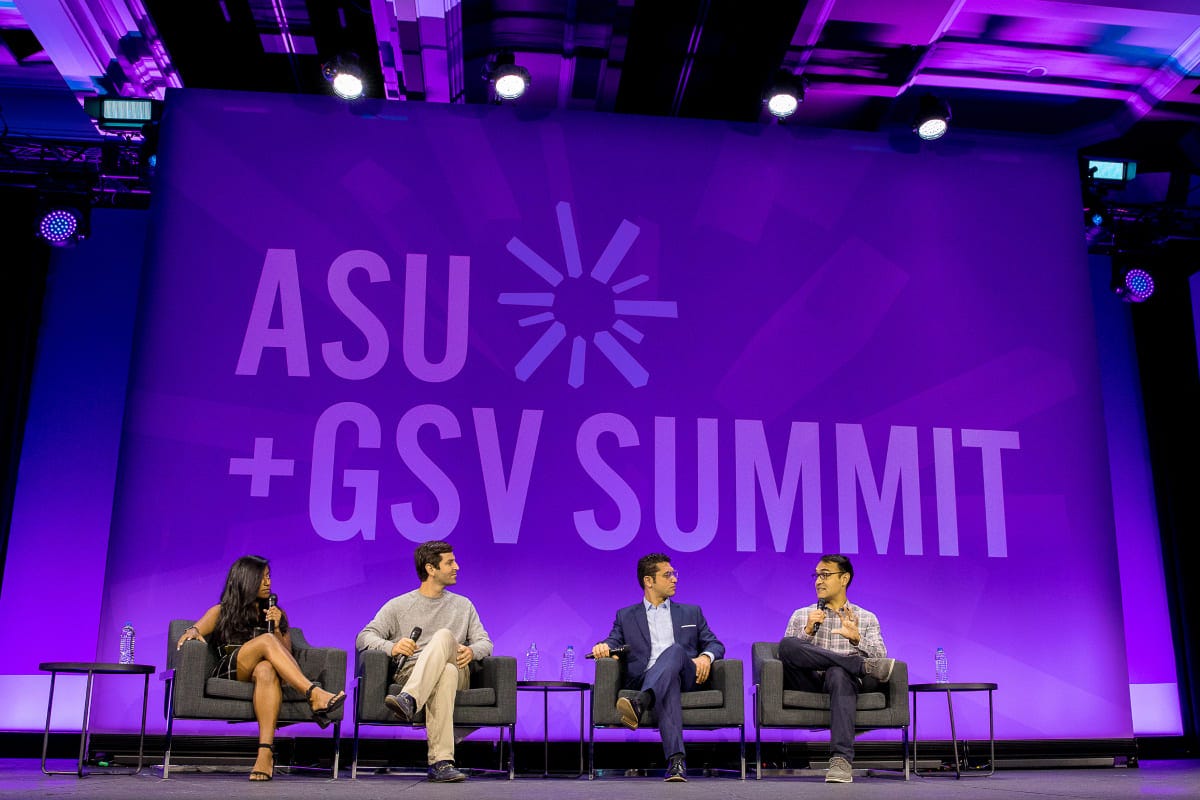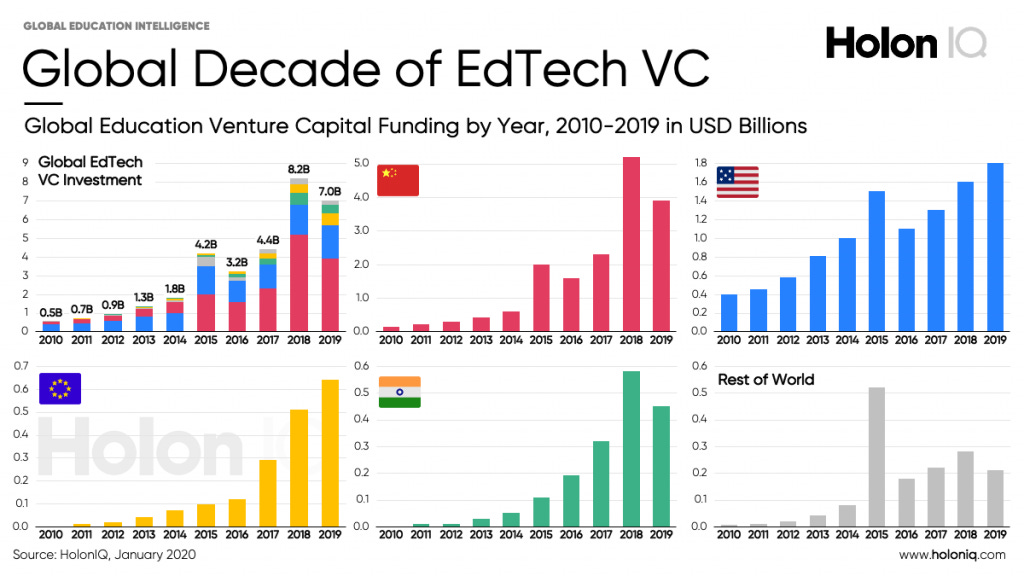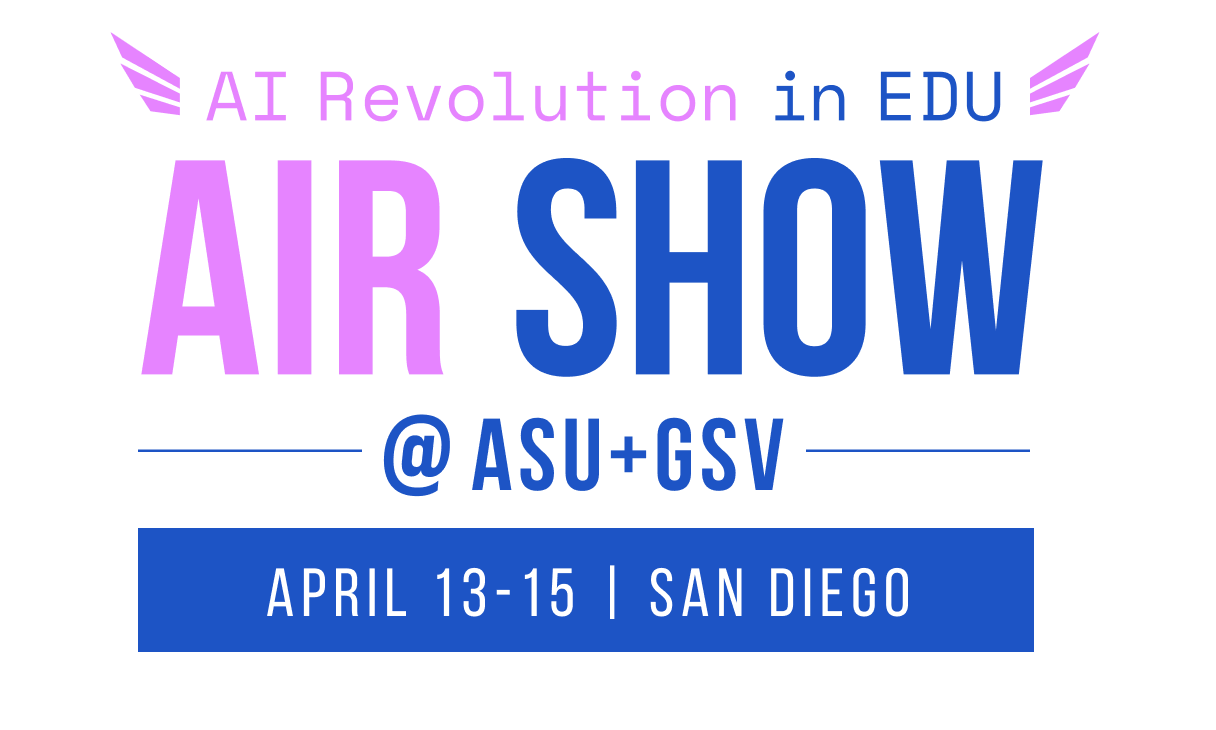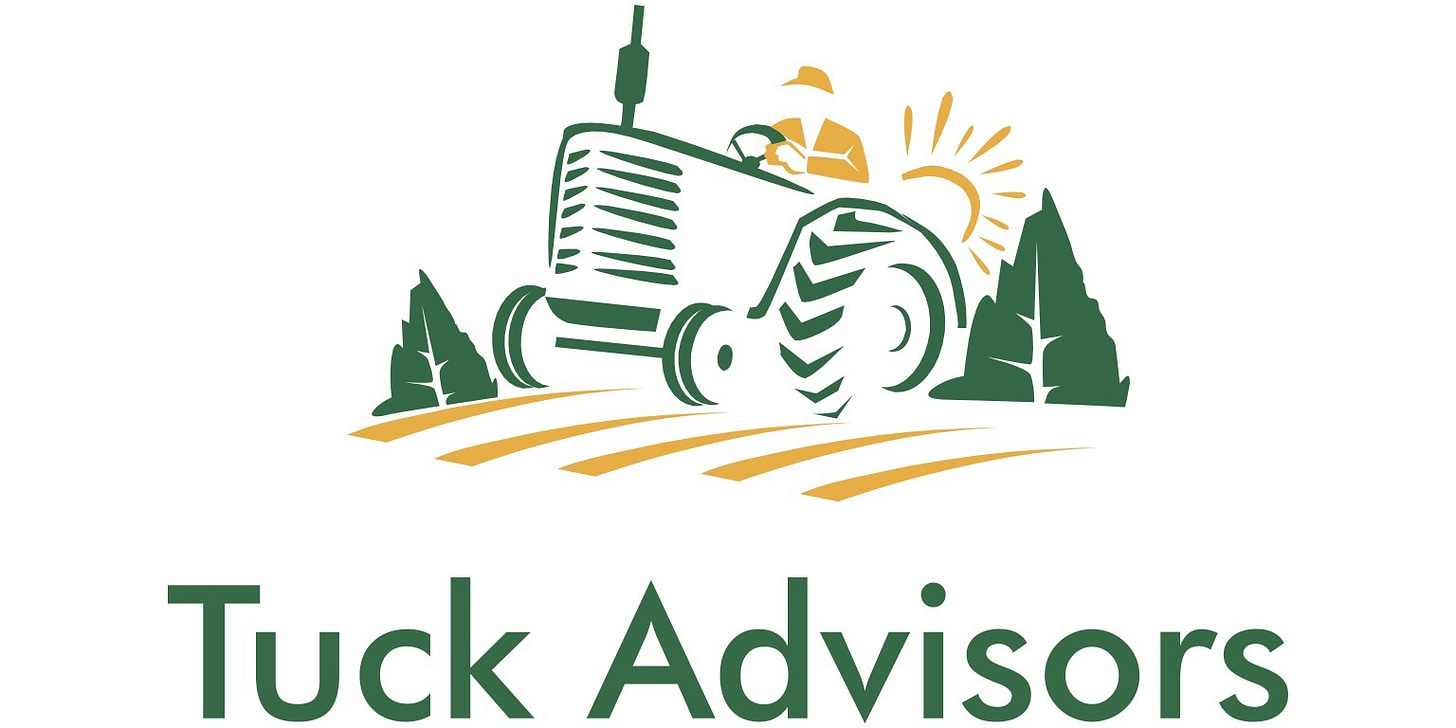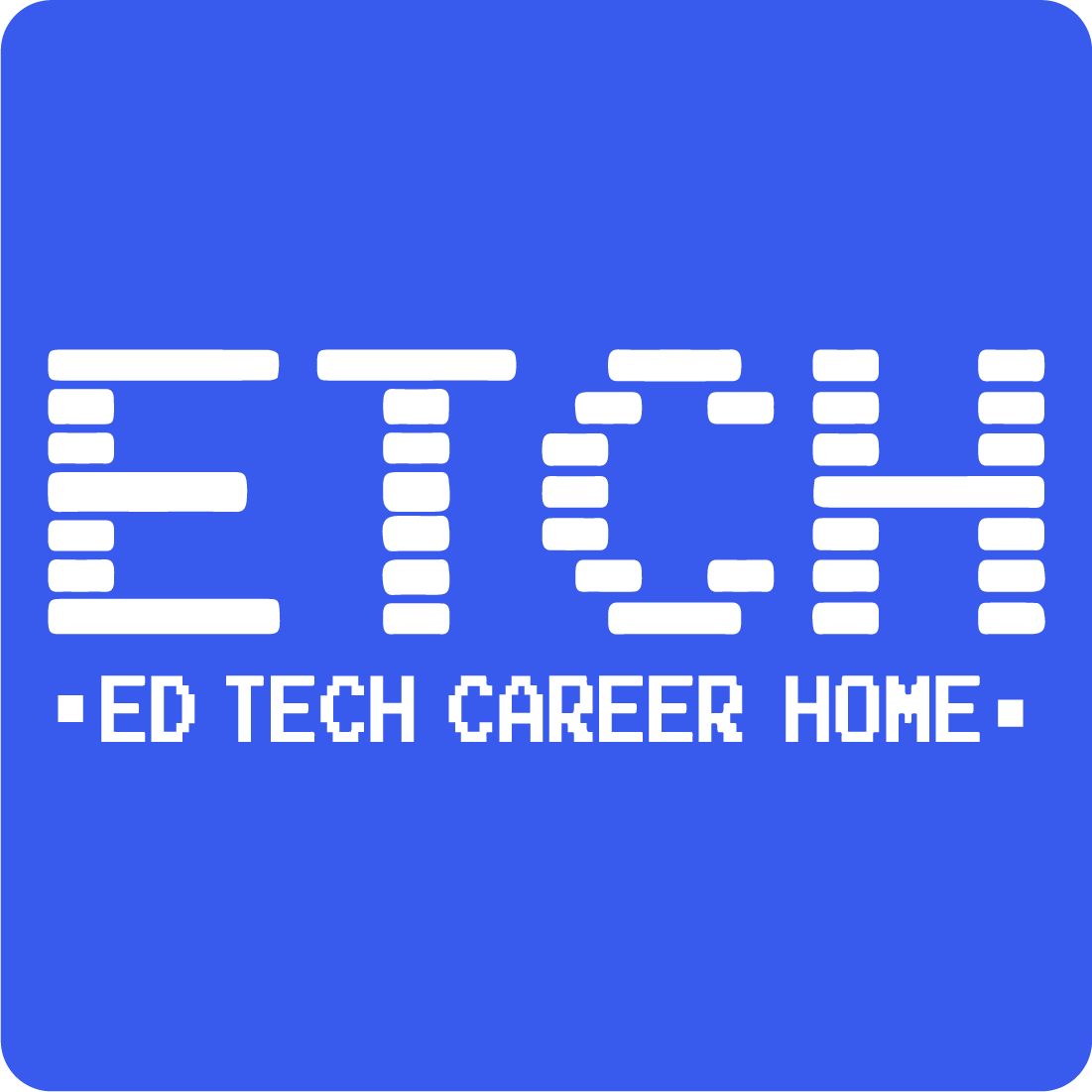The Edtech Insiders Guide to ASU+GSV 2024
And more on Spotify's video courses, Quizlet's student survey, Los Angeles Unified School District's new AI-powered "Ed" tool, and AI for PISA exams.
🚨 Follow us on LinkedIn to be the first to know about new events and content! 🚨
The Edtech Insiders Guide to ASU+GSV 2024
By Ben Kornell and Alex Sarlin
Energy is building for the upcoming ASU+GSV Summit on April 14-17 in sunny San Diego, which includes the first ever AI Revolution (AIR) Show. Here at Edtech Insiders, we’re getting pumped up by updating our AI Tools in Education Database to over 325 tools in anticipation of the conference.
For those who may not be familiar with the history of the summit, ASU+GSV began as a joint venture in 2010 between perennial innovator Arizona State University (ASU) and edtech VC firm Global Silicon Valley (GSV) Ventures as a way for edtech investors, industry players, startups, and celebrities to bump elbows and co-design the future of education technology.
For perspective, let’s remember that 2010 was the dawn of the modern tech era. In 2010:
The total amount of global edtech VC funding was $500m, which would grow ~20x before the end of the decade, before doubling again during COVID.
80% of venture funding was in the US and 20% in China. India and Europe, let alone Latin America or Africa, didn’t even make the charts (per HolonIQ).
Angry Birds and Fruit Ninja dominated the app store charts.
Rupert Murdoch’s News Corp made news by purchasing Wireless Generation (before selling it as Amplify in 2015).
Brand new edtech start-ups included Instructure, Babbel, and Udemy. In tech more broadly, the new start-ups were Instagram, Tesla, and WeWork.
All this is to say that ASU+GSV was way ahead of its time when it first began. These days, edtech is big business and ASU+GSV continues to be an influential summit with about 5,000 attendees and 80 sessions a day. ASU+GSV is sometimes called “the Davos of education” for good reason: Barack Obama, John Legend, Bill Gates, and George Bush have all delivered keynotes there, and multimillion-dollar deals can be spun up casually over drinks. Keynote speakers this year include Arne Duncan, Ben Sasse, Vinod Khosla, and… even Paula Abdul!
For attendees, ASU+GSV can be overwhelming. It can also be underwhelming. It can be two steps forward, and one step back (see: Paula Abdul). It depends on both your mindset and strategy!
If you aren’t attending in person this year, there’s no need for FOMO: the whole event will be live-streamed! For those who are planning on attending in person, we’re here to help you make the most of every minute on the ground in San Diego. Let’s dive in!
Tips from Edtech Insiders
Set up a Calendly that is specific to ASU+GSV so you can efficiently book 1:1 slots.
In your Calendly, put “The Landing: Lobby Bar” as your location. Get there before 8:30 am and hold the table all day! Don’t be shy about handing off the table to team members. Having a table is gold!
Make lunch reservations in advance at local restaurants like Sally’s Fishhouse, Puesto, and Ray’s. Who will you be meeting with? You may not know yet, but you’ll be glad you secured a lunch spot, and so will your colleagues and meeting participants.
Start each morning at Spill The Beans Coffee and Bagels. It is the best bagel sandwich in San Diego and a great place to sneak in a morning 1:1 or an early walk along the water!
Reserve 4-5 pm for recharging your (literal and metaphorical) batteries.
Go for high volume, light touch interaction. You will likely not get funded at ASU+GSV but it can be a great touch point to build relationships and momentum. Set up your chess moves.
All sessions are recorded, so prioritize those in which you think the audience will be interesting to be around. Sessions are a great way to take a breather from the non-stop conversations.
Treat it like a marathon: Hydrate. Hydrate. Hydrate. And wear comfortable shoes!
Tips from Edtech Insiders Community Experts
Alex Deeb: Get people's phone numbers so it's easier to coordinate meetups during the conference. Not everyone uses the conference app, and people aren't checking email that much.
Amanda Bickerstaff: Know who’s at the conference. I think edtech companies mistakenly think there will be a lot of district decision makers at the conference, but the percentage is pretty low. Most likely more this year at AIR, though.
Alejandro Gibes de Gac: Set up your meetings in advance. I find there's a window about a month out, then another window for last minute bookings. Then prioritize who you won't leave without meeting and stalk them at their panels.
Dan Carroll: Don’t rely on a scooter to make it to your offsite dinner: San Diego banned them. And, don’t get in a pedicab without negotiating the price first or you’ll get gouged.
Gemma Lemowitz: Keep room in your schedule for spontaneity. And, prep a few topics where you could use advice or help… people are generous with suggestions and connections.
Tony Wan: Optimize for people you don’t get to see or are far away from.
Mike Berlin: When in doubt, at night just hang out at the hotel lobby bar. A lot of deals have been born from chance conversations there.
Frankie Warren: Best meeting spot is the Manchester Hyatt Pool area!
Matt Tower: There may or may not be a highly informal surf session on Sunday. All are welcome, even just to hang on the beach. All that is asked is that you bring positive vibes.
Jacob Kantor: Sit front row, snap a pic, and then tag them all on LinkedIn and build those relationships!
Sandro Olivieri: On sessions my strategy has always been to choose sessions where you think you might want to meet the audience, not the speakers (they always get mobbed).

Edtech Insiders Speaking at ASU+GSV
If you want to catch up with the team at Edtech Insiders during ASU+GSV, here are some sessions we’re hosting that we’d love to see you join:
Sunday April 14 at 2pm: Ben and Alex speak at the AIR show “AI in the Wild”
Monday April 15 at 11am: Ben on panel at the AIR show with Erik Burmeister
Monday April 15 at 3pm: Alex moderates an ASU+GSV panel with Google, Canva, Figma and Tiktok: Creative Minds Meet AI: How AI is Transforming Education and the Workplace
Edtech Insiders ASU+GSV Happy Hour
Of course Edtech Insiders is ready to kick things off with our own happy hour at ASU+GSV on Monday April 15 from 5-7:30pm. We are excited to announce that OpenAI has joined as a co-host alongside great friends at Clever, Woolf University, Mismo, Magic EdTech, Kyron Learning, The TFA Reinvention Lab, Ed3 DAO, and Common Sense Privacy.
Please sign up for the waitlist at the RSVP link, and we will lottery off the final open spots before the event begins. We hope to see you there!
Additional Events
Here’s a few other events we will likely be crawling to! Join us, we’d love to see you in person!
Sunday, April 14
6:30-8:30pm: Future of Learning Fund Reception
Monday, April 15
4:30-5:30pm: Stanford + Reach Capital Mixer
5:00-7:30pm: EdTech Insiders Happy Hour
5:30-7:30pm: Transcend Community Gathering
6:00-8:00pm: Transatlantic Mixer
6:00-9:00pm: Cengage Mixer
Tuesday, April 16
1:00-2:30pm: Coffee and Confections with BCG
4:00-6:00pm: Charter School Growth Fund Happy Hour
5:00-7:00pm: AWS Reception
7:30-10:30pm: Cooley Event on the USS Midway
8:00-11:00pm: Martini’s and Mai Tai’s with Learn VC and Oppenheimer
8:00pm-midnight: Reach Capital After-Party
Wednesday, April 17
8-10pm: Drink alone
This edition of the Edtech Insiders Newsletter is sponsored in part by AIR Show!
Join the AI Revolution in education! Register for AIR Show, April 13-15, at the San Diego Convention Center for brilliant keynotes, hands-on workshops, student hackathons, 125+ leading AI in EDU companies, and more.
Top Edtech Headlines
1. Spotify Dips Into Edtech
In an unexpected shift into e-learning, Spotify has started testing an online education offering of freemium video courses as a new potential product. Spotify is intially working with Skillshare, PLAYvirtuoso, BBC Maestro, and Thinkific to develop and test course material.
2. Quizlet Survey: What Do Students Want and Need?
Quizlet released results from a survey with high-school and college age students to decipher if their education experiences prepared them for the real world and to identify what types of classes they wish were offered during their school years.
Here are takeaways from the survey sourced from PR Newswire:
Financial and life skills uncertainty: One-third of recent graduates don't believe they have or are unsure they have the financial and core life skills needed to succeed in the world.
Appetite for non-academic courses: 68% of recent graduates think non-academically focused courses in formal education settings would better prepare students for the real world. This belief is especially strong among respondents that attended public schools and colleges (71%).
Automotive maintenance skills are stalled: More than any other skill, nearly one in five recent graduates say they are the least confident in handling automotive maintenance, such as changing a tire or their oil. This is followed by financial planning (17%), insurance (12%), minor home repairs (11%), cooking (11%), cleaning (8%) and organizing (8%).
Financial planning woes: A majority (79%) of recent graduates said financial planning overwhelms them the most - and of all the life skills highlighted in the survey, 29% of respondents said it negatively impacts their mental health.
Social media as a learning tool: Social media is helping fill the skills gap, with 33% of recent graduates turning to it for life skills knowledge.
3. AI Application in PISA Testing and Scoring
The 2025 edition of the Program for International Student Assessment, or PISA, is looking to incorporate open-ended problem solving questions that allow test-takers to leverage AI while completing tasks meant to display thought process rather than topical knowledge. The exam is looking to include AI scoring tools to support grading as well.
4. Los Angeles Unified School District Launches AI-Powered “Ed” Tool
In response to students falling behind due to pandemic learning loss, the Los Angeles Unified School District has launched an AI-powered learning tool called “Ed” to support teaching staff, students, and families. The tool uses AI to report on key academic metrics for each student and then creates individualized plans based on that information.
5. What’s Happening in Edtech Investing?
Jakub Labun, an Investment Professional at Achieve Partners, a NYC-based impact fund investing to narrow the US skills gap, recently published an analysis of the edtech investing the edtech investing model: what works, what doesn’t, and what we could do moving forward.
This edition of the Edtech Insiders Newsletter is sponsored by Tuck Advisors.
Tuck Advisors is a trusted name in education M&A. Founded by serial entrepreneurs with over 25 years of experience starting, investing in, and selling companies, we believe founders deserve M&A advisors who work as hard as they do. If you receive any UFO's™, unsolicited flattering offers, be sure to reach out to us at confidential@tuckadvisors.com. We can help you determine if it's a hoax or if it's real.
Podcast Deep Dive: Alejandro Gibes de Gac
We have had some amazing guests on The Edtech Insiders Podcast in the last few weeks. One of our stand-out interviews from this past week is with Alejandro Gibes de Gac, CEO and Co-Founder at Paloma!
Here’s a deep dive on our interview with Alejandro Gibes de Gac, and we encourage you to give the full episode a listen for more!
Parental Involvement in Education
Alejandro Gibes de Gac discusses the pivotal role parents play in the educational achievements of their children, emphasizing that effective education extends beyond the classroom walls. He argues that despite facing systemic obstacles, parents' involvement is crucial for overcoming educational inequities and unlocking students' full potential. Alejandro's narrative reflects his personal journey and the transformative impact his parents had on his educational path.
"My purpose on this earth is to equip parents to accelerate their children's learning. And for me, that is rooted in my personal experience, my family immigrated to the US seeking better educational opportunities for their kids like so many immigrants do... So my parents were the real reason my sister and I were able to overcome the odds, overcome my circumstances and pursue our own dreams."
- Alejandro Gibes de Gac
Overcoming Educational Inequities Through Collaboration
Alejandro critiques the current education system for its inefficiencies and failure to capitalize on the value parents bring to their children's learning journey. Alejandro advocates for a paradigm shift that views parents as essential partners rather than liabilities, emphasizing the need for a collaborative approach to education that bridges the gap between home and school, fostering an environment where children can thrive.
"It felt like the education sector wasn't doing a whole lot about that we were so fixated on improving classroom instruction... And yet, it felt like we were all just trying to squeeze so much juice from this relatively small wedge."
- Alejandro Gibes de Gac
Springboard Collaborative’s Approach to Parent-Teacher Partnerships
Detailing Springboard Collaborative’s innovative methodology, Alejandro outlines how the organization successfully engages parents and teachers in a partnership aimed at boosting children’s literacy. He highlights the structured programs that facilitate mutual trust, goal setting, and celebration of achievements, which in turn, establish a solid foundation for lasting educational habits and significant improvements in students' reading outcomes.
"Springboard uses that methodology in the course of out of school time programs. It's a service that helps parents and teachers work together to accelerate early literacy outcomes in particular, serving 35,000 kids in Title One districts around the country. And the beating heart of that service is a weekly workshop where parents come in and learn how to teach reading at home."
- Alejandro Gibes de Gac
The Launch of Paloma and an AI-Driven Model
Alejandro introduces Paloma, a startup leveraging AI to enhance and scale the parental involvement model pioneered by Springboard Collaborative. Paloma aims to democratize access to quality education by providing a platform that facilitates daily, engaging, curriculum-aligned tutoring sessions at home. By doing so, it seeks to unlock the untapped teaching potential of parents, particularly those from marginalized communities, through technology.
"Paloma harnesses AI to unleash parents' untapped teaching potential... Their mobile web app helps marginalized families build and sustain a habit 15 daily minutes of short bursts tutoring at home."
- Alejandro Gibes de Gac
The Future of EdTech and Parental Engagement
Looking towards the future, Alejandro shares his vision for the role of AI and technology in fostering deeper connections within the educational ecosystem. He argues for the development of tools that enhance rather than replace human interactions, emphasizing the potential for technology to facilitate a more collaborative, equitable, and efficient education system where the unique contributions of parents and teachers are recognized and valued.
"The company that wins is the one that understands their users and their use case better than anyone else... It means that the people who are most proximate to problems can more easily bring solutions to life."
- Alejandro Gibes de Gac
Curious to Learn More?
You can listen to our full interview with Alejandro Gibes de Gac, as well as interviews with many other edtech founders, investors, and thought leaders at The Edtech Insiders Podcast! Check it out, and as always, we’d love to hear what you think!
Funding, Mergers, and Acquisitions
Our latest reporting on funding, mergers, and acquisitions comes from Matt Tower’s publication EdTech Thoughts. Matt does an incredible job of covering the latest funding, news, industry updates, and more! If you love Edtech Insiders, be sure to subscribe to Matt’s newsletter as well.
Funding
EdLight raises $4M / US, Instructor Tools / Southern Education Foundation, Charter School Growth Fund, Backstage Capital
Sprints raises $3M / Egypt, Upskilling / Disruptech Ventures, EdVentures, CFYE
Joinrs raises €1.7M / Italy, Recuritment Software / Innova Venture Fund, Doorway
UpHill raises €7M / Portugal, Workforce Powertools / Explorer, Redstone, EnjoyVenture, Brighteye Ventures, Maze, Caixa Capital, Grupo Luz Saude
Acquisitions
Cornerstone acquires Talespin / US, Upskilling
Straighterline acquires ProSolutions / US, Content Provider (Early Childhood Education)
Battery Ventures acquires Mobius Institute / US, Training Provider
N2Y acquires Texthelp / US, Special Education
Certus acquires Paulson Training / US, Upskilling
Manutan acquires Findel / UK, School Infrastructure
Uplift acquires TAO Connect / US, Mental Health
Scholastic ~acquires 9 Story Media / US, Content Provider
Toprankers acquires Judiciary arm of Coach Up IAS / India, Test Prep





